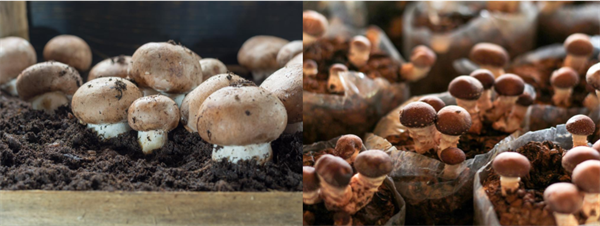
PUMPA - SMART LEARNING
எங்கள் ஆசிரியர்களுடன் 1-ஆன்-1 ஆலோசனை நேரத்தைப் பெறுங்கள். டாப்பர் ஆவதற்கு நாங்கள் பயிற்சி அளிப்போம்
Book Free DemoMushrooms:
The technology of growing mushrooms using plant, animal and industrial waste is known as mushroom cultivation.
It is wealth out of waste technology. Due to the presence of dietary fibres and protein value of mushroom, this technology has gained importance worldwide.
Mushroom is a fungus that belongs to the class basidiomycetes. There are more than \(3000\) types of mushrooms, rich in proteins, fibres, vitamins and minerals.

Mushroom cultivation
Example:
Button mushroom (Agaricus bisporus), Oyster mushroom (Pleurotus sps.), Paddy straw mushroom(Volvariella volvacea) etc.
Stages of mushroom cultivation:
The cultivation of mushrooms takes one to three months. The major stages involved in the cultivation of mushrooms are as follows:
1. Composting:
The substance that is prepared by mixing paddy straw with a number of organic materials like cow dung and inorganic fertilizers is known as compost. This compost is kept at \(50\)°C for one week.
2. Spawning:
The seeds of mushroom is known as spawn. It is produced by growing fungal mycelium in grains under sterile conditions. This spawn is sown of compost.
3. Casing:
In this stage, the compost is covered with a thin layer of soil. This provides support to the growing mushroom, provides humidity, and the temperature.
4. Pinning:
In this step the mycelium forms a little bud that develops into mushroom. These little white buds are known as pins.
5. Harvesting:
The growth of mushrooms is found better at\(15\)°C and \(23\)°C. In a week, they grow \(3\)cmwhich is considered the normal size for harvesting. During the third week, the first flush mushroom can be harvested.
6. Preservation:
During harvesting, certain main problems are faced by the mushrooms. These include discolouration, weight and loss of flavour. Hence, the following methods are used to increase their life.
- Freezing
- Drying
- Canning
- Vacuum Cooling
- Gamma radiation
- Storing at \(15\)°C